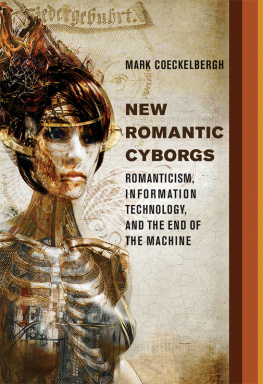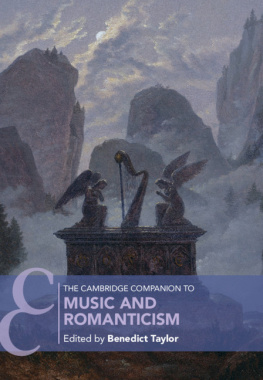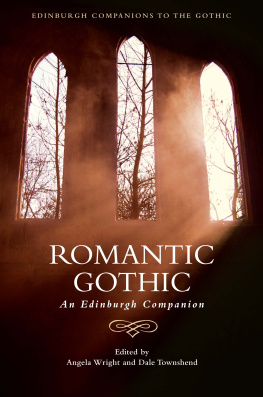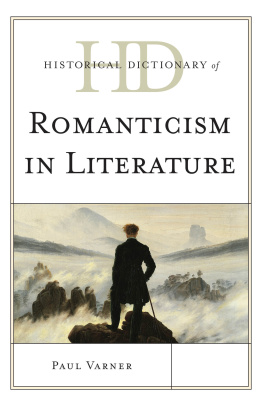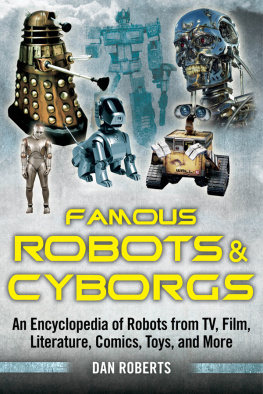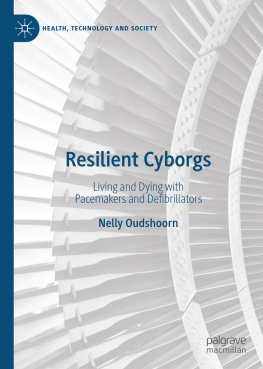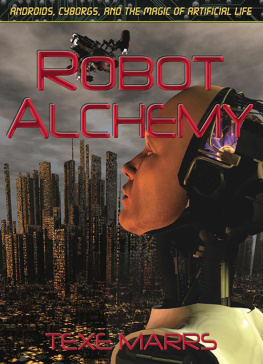Coeckelbergh - New Romantic Cyborgs
Here you can read online Coeckelbergh - New Romantic Cyborgs full text of the book (entire story) in english for free. Download pdf and epub, get meaning, cover and reviews about this ebook. year: 2017, publisher: MIT Press, genre: Romance novel. Description of the work, (preface) as well as reviews are available. Best literature library LitArk.com created for fans of good reading and offers a wide selection of genres:
Romance novel
Science fiction
Adventure
Detective
Science
History
Home and family
Prose
Art
Politics
Computer
Non-fiction
Religion
Business
Children
Humor
Choose a favorite category and find really read worthwhile books. Enjoy immersion in the world of imagination, feel the emotions of the characters or learn something new for yourself, make an fascinating discovery.
- Book:New Romantic Cyborgs
- Author:
- Publisher:MIT Press
- Genre:
- Year:2017
- Rating:3 / 5
- Favourites:Add to favourites
- Your mark:
- 60
- 1
- 2
- 3
- 4
- 5
New Romantic Cyborgs: summary, description and annotation
We offer to read an annotation, description, summary or preface (depends on what the author of the book "New Romantic Cyborgs" wrote himself). If you haven't found the necessary information about the book — write in the comments, we will try to find it.
New Romantic Cyborgs — read online for free the complete book (whole text) full work
Below is the text of the book, divided by pages. System saving the place of the last page read, allows you to conveniently read the book "New Romantic Cyborgs" online for free, without having to search again every time where you left off. Put a bookmark, and you can go to the page where you finished reading at any time.
Font size:
Interval:
Bookmark:

Mark Coeckelbergh
The MIT Press
Cambridge, Massachusetts
London, England
2017 Massachusetts Institute of Technology
All rights reserved. No part of this book may be reproduced in any form by any electronic or mechanical means (including photocopying, recording, or information storage and retrieval) without permission in writing from the publisher.
This book was set in Stone Sans and Stone Serif by Toppan Best-set Premedia Limited. Printed and bound in the United States of America.
Library of Congress Cataloging-in-Publication Data
Names: Coeckelbergh, Mark, author.
Title: New romantic cyborgs : romanticism, information technology, and the end of the machine / Mark Coeckelbergh.
Description: Cambridge, MA : MIT Press, 2017. | Includes bibliographical references and index.
Identifiers: LCCN 2016021510 | ISBN 9780262035460 (hardcover : alk. paper)
eISBN 9780262343077
Subjects: LCSH: Technology--Philosophy. | Human-machine systems--Philosophy. | Information technology--Philosophy. | Cyborgs--Philosophy. | Romanticism.
Classification: LCC T14 .C5726 2017 | DDC 601--dc23 LC record available at https://lccn.loc.gov/2016021510
ePub Version 1.0
To Tim OHagan and Nicholas Dent, from whom I learned a lot about Rousseau
I wish to thank Philip Laughlin and Judy Feldmann from the MIT Press for supporting this book project, which was not easy to categorize. I thank De Montfort University for giving me research time, which enabled me to write this book. I warmly thank Agnes Buchberger (University of Vienna) for help with formatting, editing, and image search, including dealing with copyright issues and permissions. Thanks to Vincent Mattina (cover image), Universittsbibliothek Salzburg, Wellcome Library London, and Galyonkin Sergey for the permission to use their images. I also thank my wife, Sabine, for our discussions about English history. Finally, I am grateful to have many great companions de route in philosophy of technology, with whom I hope to continue to discuss the theme of technology and romanticism. Books come to an end; philosophical journeys can go on.
Romanticism is usually seen as a historical artistic and cultural movement, starting at the end of the eighteenth century andat mostreaching far into the nineteenth century: from Jean-Jacques Rousseaus return to nature to William Morriss medievalism and beyond. As a reaction against mainstream classicism, Enlightenment rationalism, scientific objectivism, disenchantment, and attempts to crush religion, Romanticism attempted to revive and liberate subjective feeling and emotion, passion, horror, and melancholy. It tried to reenchant the world and unite what was divided. It searched for personal liberation and freedom from convention and tradition, experimented with drugs and various forms of sexual transgression, explored new aesthetic experiences such as the sublime, and tried to achieve mystical union. It embraced the exotic and the extraordinary. It tried to escape the conformism of the mainstream and the dullness of the everyday in imagination and art, for example, by evoking medieval imagery. Romanticism created imaginary worlds ranging from sweet medievalism and passionate love stories to graveyard poetry, nightmarish monsters, evil witches, and gothic horror; it even created fantasy buildings such as sham castles and other aristocratic architectural follies in order to escape to the past. At the same time, it found sublimity, liberation, and authenticity in nature. In France, Rousseau argued for liberation and for the value of authenticity as against the conventions of society. Closer to nature, the individual could be free and authentic and face the immense and overwhelming forces of nature. In Germany, intuition and emotion were prized over Enlightenment rationalism and the I was seen as intimately connected to a wider natural and spiritual history. Romanticism celebrated individual artistic genius and more general individuality, self-assertion and self-expression; artists had to express their innermost selves. Individual authenticity was the aim. The autonomous artist became the model worthy of imitation. At the same time Romanticism had a nationalist aspect when it supported expression and the liberation of the people (dasVolk) and when it celebrated national or regional culture and history, as in England and Germany. And Romanticism was wholeheartedly utopian and revolutionary, especially if the latter could be achieved by means of shedding ink rather than blood.
Although in fact Romanticism was not solely an artistic and cultural phenomenon but had many links with other domains of life and society (think, for example, about its links to politics such as the French Revolution and nationalism and its links to religious developments), and although, as I argue in this book, there are still strong romantic currents in contemporary culture, today Romanticism is usually safely put at a distance. It seems that it has little to do with our contemporary lives and personal selves at the beginning of the twenty-first century. It seems that it might be interesting for your free time (art and aesthetics more generally are often seen in this way) or that it may be of academic interest (!), but that it is neither a serious matter nor directly relevant to twenty-first-century existence, with its global economies, high-tech devices, and smart environments. Moreover, the term romantic is often used without reference to historical Romanticism, its meaning reduced to going back to the past and nostalgia. There is hardly a public discourse about the romantic heritage and what it means for our lives today.
Especially the technological dimension of our contemporary lives seems to have little to do with romanticism. Romanticism is perhaps the last thing users and developers of information and communication technologies (ICTs) think about when they engage with computer programs, electronic devices such as tablets and smartphones, autonomous robots, and so on. Most peopleand this includes many philosophers of technologysee such electronic technological devices as machines. At first sight, there seems to be nothing romantic about that; on the contrary, it seems to fit with a science-oriented worldview that excludes romanticism. But as I show in this book, this way of thinking about technology is itself shaped by romanticism and obscures a better and deeper understanding of our relation to technology, including our relation to todays electronic ICTs. While there is some academic discourse on romanticism and technology and even some technoromantic visions of technology (see below), in common use and development of ICTs the rationalist way of thinking about technology is still dominant, and many interpretations in philosophy of technology still follow thiseven if more attention is paid to implications for self and society. Computers, electronic devices, robots, and other devices are still mainly interpreted as belonging to the world of the rational, the instrumental, the mechanical. This is a world of engineers and scientists, not the world of poets, writers, artists, and visionaries. There is a gap between technology and culture, a gap that is mirrored in the one between an engineering type of philosophy of technology and a humanities type of philosophy of technology (Mitcham 1994).
Next pageFont size:
Interval:
Bookmark:
Similar books «New Romantic Cyborgs»
Look at similar books to New Romantic Cyborgs. We have selected literature similar in name and meaning in the hope of providing readers with more options to find new, interesting, not yet read works.
Discussion, reviews of the book New Romantic Cyborgs and just readers' own opinions. Leave your comments, write what you think about the work, its meaning or the main characters. Specify what exactly you liked and what you didn't like, and why you think so.

